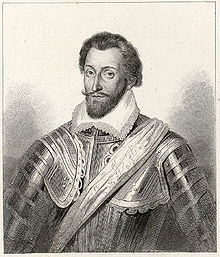André-Baptiste de Brancas

André-Baptiste de Brancas , called Amiral de Villars († July 24, 1595 at the siege of Doullens ) was Seigneur de Villars and Admiral of France .
Life
André-Baptiste de Brancas was the second son of Ennemond de Brancas, Seigneur et Baron d'Oyse, and Catherine de Joyeuse. At the beginning of his military career he was the captain of 50 armed men. He became royal lieutenant-general in the Bailliage de Rouen , de Caux et de Pont-de-l'Arche , and governor of Le Hâvre-de-Grâce .
From December 1591 to May 1592, during the eighth Huguenot War (1585–1598), King Henry IV of France besieged the Rouen , the capital of Normandy , by the soldiers of the Second Holy League (1584–1593) under the command of André de Brancas was held. The city resisted the king until the arrival of Spanish troops under Alessandro Farnese (1545–1592) , who forced the royal troops to lift the siege.
André de Brancas stayed in Rouen and did not submit to Henry IV until 1594. He was appointed Governor of Rouen and Calais , and on August 23, 1594, Admiral of France, when the incumbent Charles de Gontaut , who later became Duke of Biron Marshal of France was promoted. On September 30, 1594, he attended the session of Parliament .
On May 22, 1595 he was made a knight in the Order of the Holy Spirit , but could no longer take up membership because he was captured and killed by the Spaniards during the siege of Doullens (July 14–31, 1595).
The Spaniards under Pedro Henriquez de Acevedo and Carlos Coloma had closed the ring of siege around Doullens on July 14, 1595 . Ten days later, on July 24th, the French under Henri de La Tour d'Auvergne, duc de Bouillon , André de Brancas and François d'Orléans-Longueville, duc de Fronsac , tried to end the siege, but were defeated by the Spanish . André de Brancas was captured and shot in the head. On July 31, the Spaniards stormed Doullens and murdered the entire population.
When he died, André de Brancas was unmarried and childless. He was buried in Rouen. His heir became his younger brother, Georges de Brancas
literature
- Nicolas Rolland du Plessis, Discours véritable de la mort, funérailles et enterrement de defunct messire André de Brancas, en son vivant chevalier seigneur de Villars, conseiller au conseil d'Etat et privé du Roy , R. L'Allemant, Rouen 1595.
- François-Alexandre Aubert de La Chenaye-Desbois , Jacques Badier, Dictionnaire de la Noblesse , Paris, Schlesinger, 1853, 3rd edition, volume 3, columns 976ff
- Jean Gallian, Généalogie de la famille Brancas, 2016
Web links
- Libro d'Oro della Nobilità Mediterranea - de Brancas - Duchi di Villars e Pari di Francia ( online, accessed January 10, 2020)
Individual evidence
- ^ Alan James, The Navy and Government in Early Modern France, 1572-1661 , 2004, ISBN 0-86193-270-6 , p. 40
- ↑ Janel Mueller / Joshua Scodel, Elizabeth I: Translations, 1592-1598 , University of Chicago, p. 9.
| personal data | |
|---|---|
| SURNAME | Brancas, André-Baptiste de |
| ALTERNATIVE NAMES | Seigneur de Villars, Amiral de Villars |
| BRIEF DESCRIPTION | French military, admiral of France |
| DATE OF BIRTH | 16th Century |
| DATE OF DEATH | July 24, 1595 |
| Place of death | at Doullens |